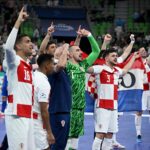ZAGREB, May 9, 2020 – Croatia had one of the strongest resistance movements in World War II Europe, which is why it was on the side of the victors, the Croatian government said on Friday, underlining the important role of Croatia’s first president Franjo Tuđman in that movement.
In a statement issued on the occasion of Victory Day, the government said that “a large number of Croatian citizens rose against Hitler’s fascist regime that had conquered the whole of Europe.”
The Croatian antifascist movement – the National Liberation Movement – was led mostly by Partisan units under the command of Josip Broz Tito but it also included a large number of members of the Croatian Peasant Party (HSS) and other political parties.
“It was owing to them that Croatia at the time had one of the strongest resistance movements in occupied Europe, emerging from World War II as a victor, with Istria and Dalmatia having been claimed back,” the statement says, noting that the first president of modern-day Croatia, Franjo Tuđman, had been a prominent member of that movement.
Istria and Dalmatia were returned to Croatia after the capitulation of Italy and the defeat of the Ustasha regime that had ceded a part of Croatian territory to Italy.
The government said that the victory over fascism, reconciliation and the culture of remembrance “were preconditions to start building a united Europe” while the collapse of communism “enabled the European integration of almost the entire continent.”
During WWII, “the darkest period in the history of humankind”, “tens of thousands of people” were killed in Croatia “because of their ethnicity or political affiliation”, the government said in the statement.
In the Ustasha-run concentration camp of Jasenovac, more than 83,000 Serbs, Roma, Jews, Croats and members of other ethnic groups were killed.
More info about the World War II can be found in the Politics section.







